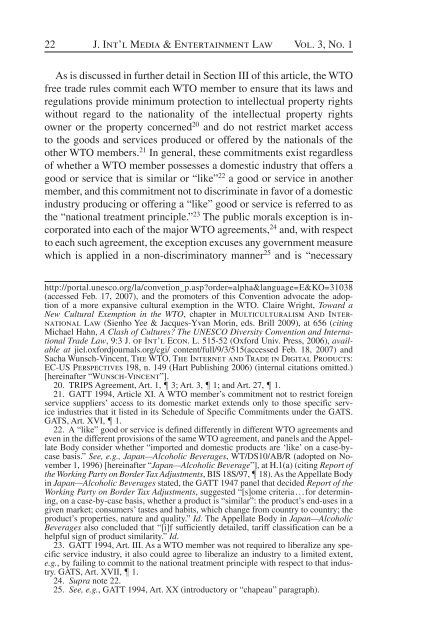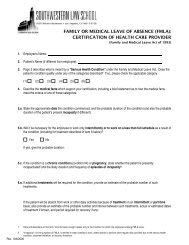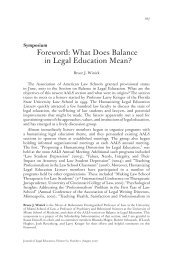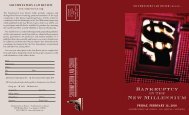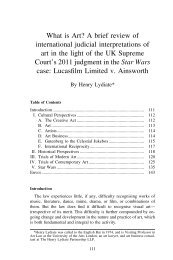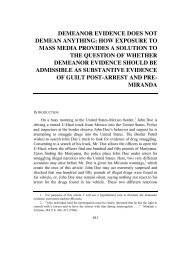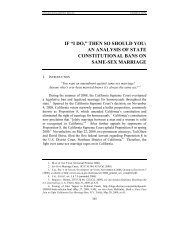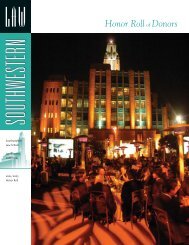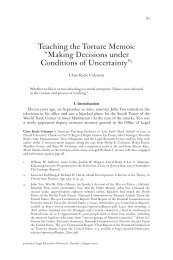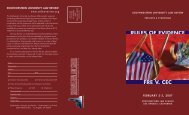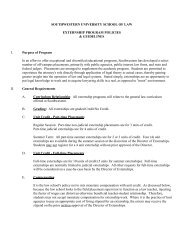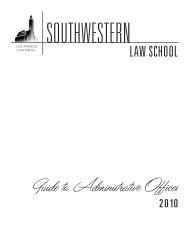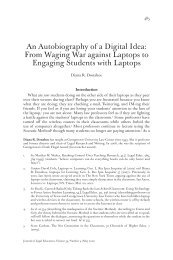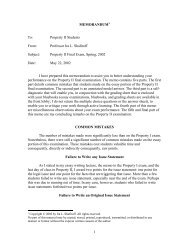Censoring the Censors in the WTO - Southwestern Law School
Censoring the Censors in the WTO - Southwestern Law School
Censoring the Censors in the WTO - Southwestern Law School
You also want an ePaper? Increase the reach of your titles
YUMPU automatically turns print PDFs into web optimized ePapers that Google loves.
22 J. Int’l Media & Enterta<strong>in</strong>ment <strong>Law</strong> Vol. 3, No. 1<br />
As is discussed <strong>in</strong> fur<strong>the</strong>r detail <strong>in</strong> Section III of this article, <strong>the</strong> <strong>WTO</strong><br />
free trade rules commit each <strong>WTO</strong> member to ensure that its laws and<br />
regulations provide m<strong>in</strong>imum protection to <strong>in</strong>tellectual property rights<br />
without regard to <strong>the</strong> nationality of <strong>the</strong> <strong>in</strong>tellectual property rights<br />
owner or <strong>the</strong> property concerned 20 and do not restrict market access<br />
to <strong>the</strong> goods and services produced or offered by <strong>the</strong> nationals of <strong>the</strong><br />
o<strong>the</strong>r <strong>WTO</strong> members. 21 In general, <strong>the</strong>se commitments exist regardless<br />
of whe<strong>the</strong>r a <strong>WTO</strong> member possesses a domestic <strong>in</strong>dustry that offers a<br />
good or service that is similar or “like” 22 a good or service <strong>in</strong> ano<strong>the</strong>r<br />
member, and this commitment not to discrim<strong>in</strong>ate <strong>in</strong> favor of a domestic<br />
<strong>in</strong>dustry produc<strong>in</strong>g or offer<strong>in</strong>g a “like” good or service is referred to as<br />
<strong>the</strong> “national treatment pr<strong>in</strong>ciple.” 23 The public morals exception is <strong>in</strong>corporated<br />
<strong>in</strong>to each of <strong>the</strong> major <strong>WTO</strong> agreements, 24 and, with respect<br />
to each such agreement, <strong>the</strong> exception excuses any government measure<br />
which is applied <strong>in</strong> a non-discrim<strong>in</strong>atory manner 25 and is “necessary<br />
http://portal.unesco.org/la/convetion_p.asporder=alpha&language=E&KO=31038<br />
(accessed Feb. 17, 2007), and <strong>the</strong> promoters of this Convention advocate <strong>the</strong> adoption<br />
of a more expansive cultural exemption <strong>in</strong> <strong>the</strong> <strong>WTO</strong>. Claire Wright, Toward a<br />
New Cultural Exemption <strong>in</strong> <strong>the</strong> <strong>WTO</strong>, chapter <strong>in</strong> Multiculturalism And International<br />
<strong>Law</strong> (Sienho Yee & Jacques-Yvan Mor<strong>in</strong>, eds. Brill 2009), at 656 (cit<strong>in</strong>g<br />
Michael Hahn, A Clash of Cultures The UNESCO Diversity Convention and International<br />
Trade <strong>Law</strong>, 9:3 J. of Int’l Econ. L. 515-52 (Oxford Univ. Press, 2006), available<br />
at jiel.oxfordjournals.org/cgi/ content/full/9/3/515(accessed Feb. 18, 2007) and<br />
Sacha Wunsch-V<strong>in</strong>cent, The <strong>WTO</strong>, The Internet and Trade <strong>in</strong> Digital Products:<br />
EC-US Perspectives 198, n. 149 (Hart Publish<strong>in</strong>g 2006) (<strong>in</strong>ternal citations omitted.)<br />
[here<strong>in</strong>after “Wunsch-V<strong>in</strong>cent”].<br />
20. TRIPS Agreement, Art. 1, 3; Art. 3, 1; and Art. 27, 1.<br />
21. GATT 1994, Article XI. A <strong>WTO</strong> member’s commitment not to restrict foreign<br />
service suppliers’ access to its domestic market extends only to those specific service<br />
<strong>in</strong>dustries that it listed <strong>in</strong> its Schedule of Specific Commitments under <strong>the</strong> GATS.<br />
GATS, Art. XVI, 1.<br />
22. A “like” good or service is def<strong>in</strong>ed differently <strong>in</strong> different <strong>WTO</strong> agreements and<br />
even <strong>in</strong> <strong>the</strong> different provisions of <strong>the</strong> same <strong>WTO</strong> agreement, and panels and <strong>the</strong> Appellate<br />
Body consider whe<strong>the</strong>r “imported and domestic products are ‘like’ on a case-bycase<br />
basis.” See, e.g., Japan—Alcoholic Beverages, WT/DS10/AB/R (adopted on November<br />
1, 1996) [here<strong>in</strong>after “Japan—Alcoholic Beverage”], at H.1(a) (cit<strong>in</strong>g Report of<br />
<strong>the</strong> Work<strong>in</strong>g Party on Border Tax Adjustments, BIS 18S/97, 18). As <strong>the</strong> Appellate Body<br />
<strong>in</strong> Japan—Alcoholic Beverages stated, <strong>the</strong> GATT 1947 panel that decided Report of <strong>the</strong><br />
Work<strong>in</strong>g Party on Border Tax Adjustments, suggested “[s]ome criteria . . . for determ<strong>in</strong><strong>in</strong>g,<br />
on a case-by-case basis, whe<strong>the</strong>r a product is “similar”: <strong>the</strong> product’s end-uses <strong>in</strong> a<br />
given market; consumers’ tastes and habits, which change from country to country; <strong>the</strong><br />
product’s properties, nature and quality.” Id. The Appellate Body <strong>in</strong> Japan—Alcoholic<br />
Beverages also concluded that “[i]f sufficiently detailed, tariff classification can be a<br />
helpful sign of product similarity.” Id.<br />
23. GATT 1994, Art. III. As a <strong>WTO</strong> member was not required to liberalize any specific<br />
service <strong>in</strong>dustry, it also could agree to liberalize an <strong>in</strong>dustry to a limited extent,<br />
e.g., by fail<strong>in</strong>g to commit to <strong>the</strong> national treatment pr<strong>in</strong>ciple with respect to that <strong>in</strong>dustry.<br />
GATS, Art. XVII, 1.<br />
24. Supra note 22.<br />
25. See, e.g., GATT 1994, Art. XX (<strong>in</strong>troductory or “chapeau” paragraph).<br />
3058-088-3pass-02_Wright-r03.<strong>in</strong>dd 22<br />
6/30/2010 12:01:58 PM


